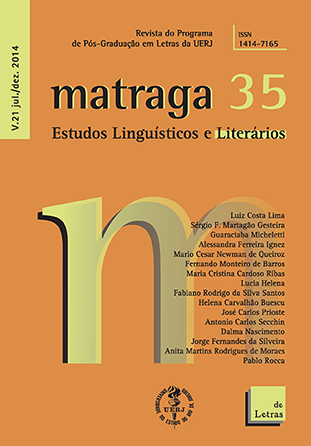QUANDO DEIXOU A NATUREZA DE FALAR COM O POETA? A POESIA PORTUGUESA NA SEGUNDA METADE DO SÉCULO XIX
Palavras-chave:
liber mundi, interpretação, legibilidade do mundo.Resumo
Este ensaio segue a hipótese de que a poesia portuguesa da segunda metade do século XIX representa a clivagem decisiva que se dá na modernidade. Ela implica, por um lado, a crença num sentido do mundo espelhável na natureza, a que o poeta acede através da leitura do livro do mundo, e, por outro, uma progressiva descrença de que o mundo seja legível e, sequer, que seja um livro. A morte de Deus é um corolário da perda deste sentido.
Downloads
Downloads
Publicado
Como Citar
Edição
Seção
Licença
AUTORIZAÇÃO
A Matraga – Revista do Programa de Pós-Graduação em Letras da UERJ está autorizada a publicar o artigo ora submetido, caso seja aceito para publicação online. Fica atestado que a contribuição é original, que não está sendo submetida a outro editor para publicação, e que a presente declaração é a expressão da verdade.
Os trabalhos publicados no espaço virtual da Matraga – Revista do Programa de Pós-Graduação em Letras da UERJ serão automaticamente cedidos, ficando os seus direitos autorais reservados à Matraga. Sua reprodução, total ou parcial, é condicionada à citação dos autores e dos dados da publicação.

A Matraga utiliza uma Licença Creative Commons - Atribuição-NãoComercial 4.0 Internacional.





